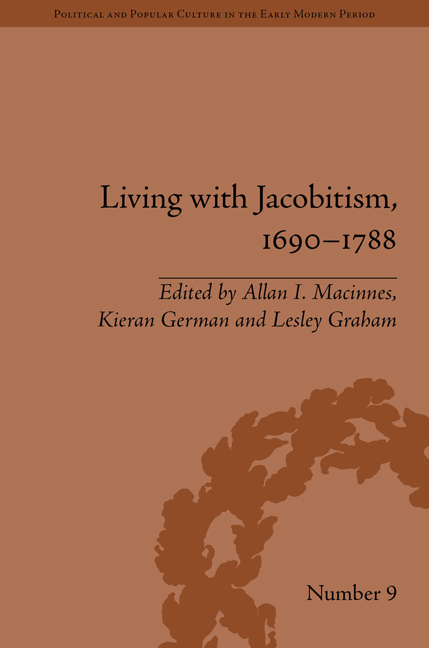Book contents
- Frontmatter
- CONTENTS
- List of Contributors
- List of Figures
- Abbreviations
- Preface: Breandán Ó Buachalla, A Tribute
- Introduction: Living with Jacobitism
- 1 The First Jacobite and the Scottish Parliament
- 2 The Scottish Jacobite Community at Saint-Germain after the Departure of the Stuart Court
- 3 Liturgy: The Sacramental Soul of Jacobitism
- 4 ‘Zealous in the Defence of the Protestant Religion and Liberty’: The Making of Whig Scotland, c. 1688–c. 1746
- 5 Jonathan Swift's Memoirs of a Jacobite
- 6 ‘Female Rebels’: The Female Figure in Anti-Jacobite Propaganda
- 7 Commerce and the Jacobite Court: Scottish Migrants in France,1688–1718
- 8 Ultramontane Ultras: The Intellectual Character of Irish Students at the University of Paris
- 9 To a Fair Meeting on the Green: The Order of Toboso and Jacobite Fraternalism, 1726–c. 1739
- 10 English and Scottish Jacobite Painters in Eighteenth-Century Rome
- 11 Polite War: Material Culture of the Jacobite Era, 1688–1760
- 12 Robert Adam: ‘My Mother's Dear British Boy’
- 13 From Jacobite to Jacobin: Robert Watson's Life in Opposition
- 14 Robert Louis Stevenson's ‘The Young Chevalier’: Unimagined Space
- Notes
- Index
3 - Liturgy: The Sacramental Soul of Jacobitism
- Frontmatter
- CONTENTS
- List of Contributors
- List of Figures
- Abbreviations
- Preface: Breandán Ó Buachalla, A Tribute
- Introduction: Living with Jacobitism
- 1 The First Jacobite and the Scottish Parliament
- 2 The Scottish Jacobite Community at Saint-Germain after the Departure of the Stuart Court
- 3 Liturgy: The Sacramental Soul of Jacobitism
- 4 ‘Zealous in the Defence of the Protestant Religion and Liberty’: The Making of Whig Scotland, c. 1688–c. 1746
- 5 Jonathan Swift's Memoirs of a Jacobite
- 6 ‘Female Rebels’: The Female Figure in Anti-Jacobite Propaganda
- 7 Commerce and the Jacobite Court: Scottish Migrants in France,1688–1718
- 8 Ultramontane Ultras: The Intellectual Character of Irish Students at the University of Paris
- 9 To a Fair Meeting on the Green: The Order of Toboso and Jacobite Fraternalism, 1726–c. 1739
- 10 English and Scottish Jacobite Painters in Eighteenth-Century Rome
- 11 Polite War: Material Culture of the Jacobite Era, 1688–1760
- 12 Robert Adam: ‘My Mother's Dear British Boy’
- 13 From Jacobite to Jacobin: Robert Watson's Life in Opposition
- 14 Robert Louis Stevenson's ‘The Young Chevalier’: Unimagined Space
- Notes
- Index
Summary
The majority of Scottish Episcopalians in the eighteenth century were for the Jacobite cause and therefore subject to persecution. However, it was possible to work round the legislation against Episcopalians, especially if one wanted to hold public office. For example, non-jurors in Aberdeen could give the public impression of juring by attending St Paul's Chapel, in Loch Street in the city, which used the English Communion Office, prayed for King George and sang praise accompanied by its fine organ; yet they could discreetly pray for ‘the king over the water’ at one of the town's several nonjuring meeting houses. Adherence to the Jacobite cause cost the Episcopal communion greatly. The Revolution of 1689 and subsequent seizure of the throne by William of Orange had caused the Episcopal party in the Scots Kirk to be extruded. Episcopal clergy were forced out of parishes although in some cases this took several decades. The failure of the Jacobite risings was attended by subsequent persecution. The penal laws enacted in 1746 and 1748 were intensive and practically destroyed Episcopacy in Scotland. An Episcopalian, whether a juror or a non-juror, was perceived by the British government to be, to all intents and purposes, an inveterate Jacobite. Colonel Yorke in the aftermath of Culloden was convinced that Episcopalians of whatever flavour would simply not do. William Augustus, Duke of Cumberland, in the north and north-east, post Culloden, was out to extirpate Episcopacy from Scots soil – and he almost succeeded.
- Type
- Chapter
- Information
- Living with Jacobitism, 1690–1788The Three Kingdoms and Beyond, pp. 39 - 54Publisher: Pickering & ChattoFirst published in: 2014



